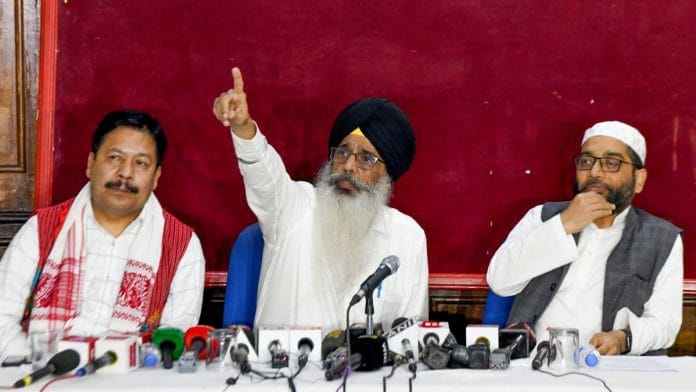New Delhi: The Centre’s thrust on a Uniform Civil Code (UCC) is a threat not only to fundamental rights and the concept of ‘unity in diversity’ but a bid to scrap reservation for Scheduled Castes (SCs), Scheduled Tribes (STs) and Other Backward Classes (OBCs), read a joint statement issued here Wednesday by representatives of various minority groups.
The joint statement was issued at a press conference held at the Press Club of India in New Delhi following a meeting of representatives of various minority groups to discuss the idea of a UCC. The meeting was attended by representatives of the All India Muslim Personal Law Board (AIMPLB), the Federation of Catholic Associations of Delhi archdiocese and Naba Kumar Sarania, the independent MP from Assam’s Kokrajhar, among others.
“The government has no business to interfere in the customary laws and religious practices of social groups, tribals, Dalits, and religious communities,” read the statement. It went on to allege that the central government intends to ‘scrap reservation in the garb of equality’.
Signatories to the joint statement said they will hold discussions with representatives of other communities on this issue.
The fundamental idea behind a Uniform Civil Code is to have a standard set of laws governing personal matters such as marriage, divorce and inheritance, irrespective of religion.
On 14 June, the 22nd Law Commission, chaired by former Karnataka High Court chief justice Ritu Raj Awasthi, had sought the views of the public and religious organisations on a UCC. The panel initially decided on 14 July as the last date to receive comments, which was later extended to 28 July.
Implementation of a UCC, the construction of a Ram Temple in Ayodhya and the abrogation of Article 370 have been the three most prominent ideological commitments of the Bharatiya Janata Party (BJP). Addressing party workers in Bhopal on 27 June, Prime Minister Narendra Modi endorsed the idea of a UCC by saying that a situation wherein there are “separate laws for separate communities” is counterintuitive for the country.
To that extent, Uttarakhand Chief Minister Pushkar Singh Dhami has tasked a five-member expert committee to submit a report on the feasibility of a UCC.
Also Read: UCC could be around the corner, but divorce still comes in many colours in India
‘What has changed?’
Questioning the need for a UCC, Jagmohan Singh, convener of the Sikh Personal Law Board — an outfit floated by Delhi-based activists earlier this month — termed it an “attempt to push BJP’s agenda of a Hindu Rashtra”.
“Right now, we are politely telling the government that UCC is not needed,” Singh said at the press conference Wednesday.
Syed Sadatullah Husaini, vice president of the AIMPLB, said the central government shouldn’t interfere in religious matters. “We had a long discussion on the issue and have decided to oppose it. The 21st Law Commission clearly said it (UCC) is neither necessary nor desirable. Then what was the need to invite comments? What has changed now?”
Asked about the apprehensions expressed by various parties who fear that a UCC could lead to scrapping of reservation, Waman Meshram, president of the All India Backward And Minority Communities Employees Federation (BAMCEF), said, “When everyone is going to be equal, they can easily say that there is no need for reservation. This is an attempt to deprive SC, ST and OBC communities of the benefits of reservation.”
Founder member of the National Conference of Minorities, Rahul Dambale said it was “unfortunate” that the “government is pushing for a UCC only to gain political advantage”.
(Edited by Amrtansh Arora)
Also Read: Nehru’s Hindu Code Bill vs Modi’s UCC— same script, same drama, different Indias






